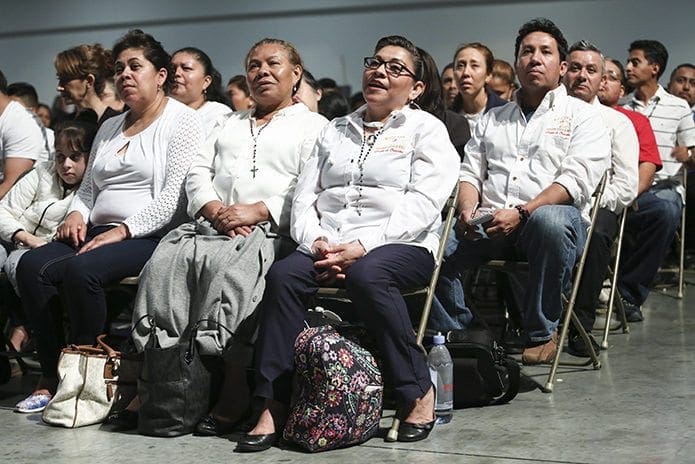 Photo By Michael Alexander
Photo By Michael AlexanderCollege Park
Hispanics feel the presence of God at the Eucharistic Congress
By DANIELA MORENO, Special to the Bulletin | Published June 10, 2016
COLLEGE PARK—It’s a beautiful Saturday morning. Blue skies and white clouds are the witnesses to this colorful event full of joy, worship and music. It is 8:30 a.m. June 4 and the crowd is getting ready to start the procession into the Georgia International Convention Center where, once again, Catholics in Georgia gather to celebrate the Eucharistic Congress. People sing, dance and worship our Lord Jesus Christ with devotion.
“Aquí se siente la presencia de Dios—Here you feel the presence of God” is sung by a group of people from St. Joseph Church, Marietta.
Another group from San Felipe de Jesús Mission, Forest Park, all wearing blue, sings “Yo tengo un amigo que me ama, y su nombre es Jesús—I have a friend who loves me, and his name is Jesus.”
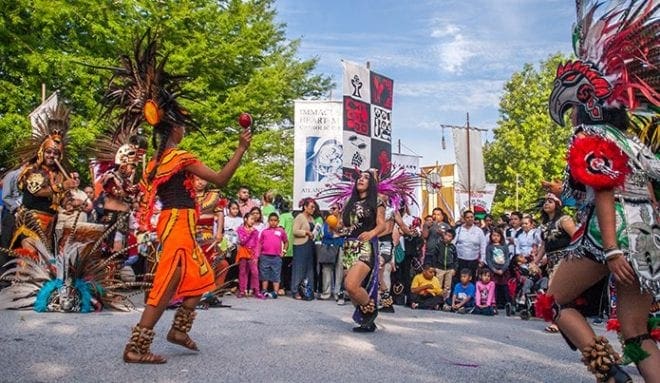
The dance group from St. Matthew Church, Winder, dances in honor of the Virgin Mary outside the Georgia International Convention Center June 4. The centuries-old tradition of brilliantly costumed dancers performing religious dances is being passed on to a new generation by groups in several parishes. Photo By Thomas Spink
Sister María Pia is originally from the Philippines but serves the Hispanic community at St. Joseph, as well as the Missions of San Felipe and Divino Niño Jesús, Duluth. She lived in Mexico for 10 years so her Spanish is fluent. She has been coming to the Eucharistic Congress since 2012 and believes this year’s theme couldn’t fit any better what they try to do every day at the mission and parish level, to “grow in mercy to serve others.”
There are groups present from all over Georgia, some singing and playing instruments, some dancing wearing traditional dress, and others just walking and praying in adoration. This cultural outpouring of faith displayed through songs, instruments, outfits and banners is just incredible.
This is the first time I have attended the Eucharistic Congress, and even though people have told me about it, this has by far surpassed my expectations. This is amazing.
A smile that heals
After the morning Benediction is over, the excitement is contagious. The moving wall that splits one large hall into two areas, creating the Spanish and English tracks, starts to unfold slowly. Members of the band mount the stage in the Spanish track, now illuminated. It is a very slow process so the band starts playing. It is a loud and rhythmic combination of Caribbean, Latin American and pop music. I love it, and I’m sure everyone else in this room does, too!
A young lady named Aurora Nuñez, a parishioner of St. John the Evangelist Church in Hapeville for the last year and a half, is at her first Eucharistic Congress. Born in Michoacán, Mexico, Aurora, a young adult, has been living in Georgia for 12 years. Aurora, her mother (also attending this year’s congress) and her two brothers were in a car accident six years ago. One of her brothers died, her mom was hospitalized for a month, and her other brother had no injuries. Aurora’s condition was delicate. At first, doctors thought she was going to be completely paralyzed from the neck down. However, during surgery, doctors realized she was going to be able to use her arms. When her parents learned she was not going to be able to walk again, they were devastated, especially her father. She was more positive.
“I always smile even if I feel some pain inside,” she said. “I do it for my mom, because she gets very depressed and if I fall, she would fall with me.” Some tears crossed her cheeks, but she was still smiling.
She continued, “After the accident, I had more time to do other things that I always wanted to do, like learn how to knit. That’s something I now master!”
Aurora also wants to learn to play the guitar and the accordion. Asked what made her come to the congress, she responded, “To share with my community. We all need to make an effort to get to know each other better in our parish.”
Festive joy

Members of the Hispanic music group Sh3ma, from St. John Neumann Church, Lilburn, lead praise in the Spanish track at the 2016 Eucharistic Congress June 4. Julian Romero directed the group at the congress. Photo By Thomas Spink
The music continues and the joy increases. The area seats over 7,000 people. It is now 11:20 and the band does not have to make much effort to encourage people to sing to the Lord. People clap and some even dance. You can feel the love, the festivity, the happiness. “Glory to you, Lord! We adore you today. Alleluia, Alleluia, we adore you today, Lord!” singers intone.
Jairo Martinez, director of the Office of Intercultural and Ethnic Diversity for the Archdiocese of Atlanta, introduces the master of ceremonies, Carlos Yucute, a native of Guatemala, who serves in several ministries at his Alpharetta parish, St. Thomas Aquinas, and also serves the Spanish Catholic radio program “Que Onda con Nuestra Fe.” He welcomes the congregation and introduces the first speaker of the day, Father Feiser Muñoz.
“Life itself is an act of mercy”
Father Muñoz, 31, is from Colombia. He moved to the United States in 2008 and studied English as a second language at Georgia State University. He completed his theological studies at St. Vincent Seminary in Latrobe, Pennsylvania, in May 2013 and was ordained a priest for the Archdiocese of Atlanta on June 8 that year. He serves as a parochial vicar at the Cathedral of Christ the King and at the Cathedral’s Hispanic Mission.
“Today we will talk about mercy,” he said, paraphrasing the congress theme, “Be merciful just as your Father is merciful.”
“This is a difficult topic, and to talk about mercy we need to know our Father,” he said.
Father Muñoz explained that even when the mercy of God is hard to comprehend in a world that displays injustice, oppression, discrimination, war and disease, there is always hope in every circumstance, and things can always get better. It is that hope that helps us to be merciful.
“Mercy means to have your heart … for the poor. Poverty is not always about physical hunger. One can be poor and have lots of money or can be rich and also have lots of money. And the opposite is true, too. Poverty is about the need of God in our lives,” he said. “Every human being can’t escape from pain and suffering. It can be physical or emotional, but there is not even one person on earth that escapes from it.”
Father Muñoz was very emphatic when he repeated that despite the pain, there is always hope for a better tomorrow.
“Life itself is an act of mercy. Our siblings, our parents, are part of that mercy. Let’s start accepting them as they are, with their virtues and weaknesses. Let’s forgive our brothers and sisters. Let’s be merciful with our families. That’s a good start,” he said.
Bishop Zarama: “Let God guide us”
After Father Muñoz spoke, Bishop Luis R. Zarama entered the room carrying the Blessed Sacrament. A deacon was touching his shoulder all the way to the stage.
Bishop Zarama said, “The Blessed Sacrament is so big that I could not see anything in front of me, so a deacon guided me all the way here. I was not able to see, but I trusted him.”
“We need to let God guide us and we need to trust in him.”
To experience God’s love and mercy, we must first acknowledge that we have weaknesses and that our hearts have been broken. He then added, “What can we do to rejuvenate our hearts? Smile, always smile, that’s a good way to experience the love and mercy of God.”
I turned around and looked at Aurora’s beautiful smile, hoping she thought God was talking directly to her through Bishop Zarama’s words.
“Pregnant with love for Jesus and each other”
The next speaker, Francisco “Pacho” Bermeo, was born in Bogotá, Colombia. Married to a singer-songwriter of Catholic music, he has a 9-year-old daughter. He and his wife are dedicated full time to the service of God’s kingdom. At 13, he began his spiritual experience in the Catholic charismatic renewal. He has served in different areas of the charismatic renewal in his country and also in Latin America. He studied philosophy at the Minuto de Dios University in Bogotá and theology at the Pontificia Universidad Javeriana. He completed a degree in biblical pastoral studies from the Pastoral Biblical Center for Latin America of CELAM (the Latin American Council of Catholic Bishops). He has served as a speaker in his homeland and in the United States, Mexico, Puerto Rico, Cuba, Central and South America, England and Israel.
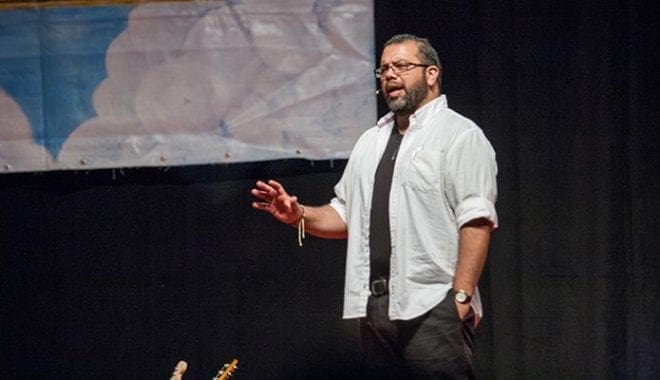
Charismatic speaker Francisco “Pacho” Bermeo, from Colombia, challenges both men and women to become “pregnant with love for Jesus and for one another” as he teaches about mercy as heartfelt concern for another person. Photo By Thomas Spink
Bermeo centered his speech in how he understands mercy and how we can be merciful to one another. On multiple occasions, he made the audience laugh with jokes and examples that made all reflect about the way we live our lives. For him, the best way to describe mercy is to talk about Mary, the Blessed Mother.
He said that the Hebrew word for mercy is rahamim, and the root of that same word means uterus. In 1997 on a trip to Israel, a Hebrew farmer told him that mercy means “having another inside you.”
To make the audience understand what he was saying, Bermeo asked, “Have you ever had your mom ask you—‘What happened?’—even before you tell her? She knows something is going on because she cares about you, she had you inside and still feels that connection. She knows you and is merciful.”
For Bermeo, mercy is not an emotion but a responsibility we should have for one another, like the responsibility a mother has and feels for her child.
During his presentation there was a lot of interaction with the audience. At one point, he made all the men stand up and said, “I want you to leave this room pregnant.” At first people laughed, but then his voice got stronger and it was almost like a demand: “I want you to feel the other inside you, and love, care for and respect others as if you were pregnant.”
He then asked all the women to get up and said, “If you thought you were done having children, you are wrong.” The whole audience laughed out loud. “You are also leaving this room pregnant with love for Jesus and one another.”
He then made everybody hug each other as a family. I had moved to a different area and was sitting by myself with no one next to me, but watching everybody hugging each other made me remember my wonderful family, and I cried.
Bermeo said to live as mercifully as Mary, we first need to be merciful with ourselves, living with dignity as children of God. He recalled he was only 9 months old when his mother made the decision to leave his father because he was very abusive. He said his mother taught him at that young age the meaning of dignity.
“I want everyone to leave this room with the intention of living a life with dignity where begging is not part of it.”
“Some people think that living a Eucharistic life means just taking the host every Sunday. No!” he said expressively. “Living a Eucharistic life means to know you are valuable, to understand that your self-esteem is important and should be high, that you are a divine creation of God and that others are also divine creations of God. It is about the way you treat yourself and the way you treat others.”
Bermeo finished his speech saying, “The Virgin Mary told the Angel Gabriel that she accepted to get pregnant, and since that moment Jesus is inside of her. Do the same! Feel the same! Get pregnant, fill your soul with Jesus: rahamim. Live a Eucharistic life, change your life, and make the decision to live with dignity, as Maria did. Then share with others. Treat others with that same love, be merciful to others.”
A message of love from Archbishop Gregory
I suddenly heard someone speaking Spanish with what to me sounded like a Brazilian accent. I thought it was someone from the band giving a beautiful message. I turned around and saw on one of the big screens Archbishop Wilton D. Gregory speaking Spanish. It was the first time I heard him speaking Spanish, giving what was a short and beautiful message of love. Just knowing that he made the effort to speak Spanish in front of such a big audience made me feel very proud of him and very happy, too.
The path to promote the pro-life message
Speaker Ramona Treviño’s testimony was touching and powerful. This was only her fifth time giving a speech in Spanish.
“This is a very large crowd. I did not know it was going to be this big. It is not easy for me to speak Spanish, but I will do my best,” she said.
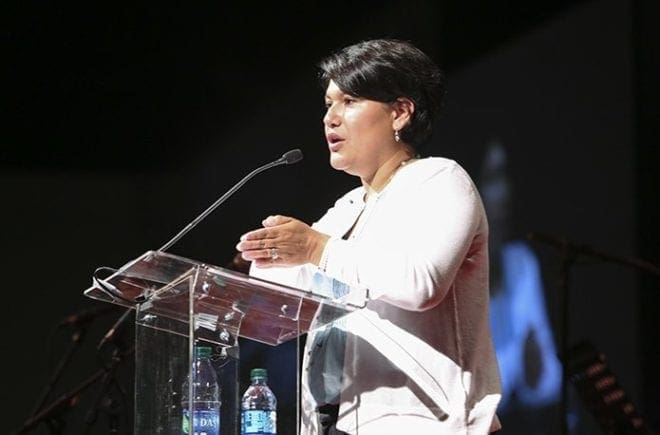
Ramona Treviño, a former Planned Parenthood employee, who now serves as a spokeswoman for 40 Days for Life in Dallas, speaks to a large audience during an afternoon session in the Spanish track. Photo By Michael Alexander
She is the third generation born in the United States from Mexican great-grandparents. Her Spanish is wonderful. Even though her parents married in the Catholic Church, they were never fervent parishioners. Both she and her sister were baptized but never received religious education. Pregnant at 16, she dropped out of high school and entered an abusive marriage, which ended in divorce. She remarried in 2006, this time in the Catholic Church, and in 2007 had her second child. Wanting to make a difference and to help girls in similar tough situations, in 2008 she accepted a job as the director of a Planned Parenthood facility in Sherman, Texas. The title and the salary made the position even more attractive. She helped young ladies facilitate abortions although the clinic she worked at did not perform them.
“I was a hypocrite. I would tell my oldest daughter to wait until she was married to have sex, but then at work I would advise girls not only to avoid pregnancy with hormonal contraceptives but even to get rid of their babies if they got pregnant,” she said.
Over time, however, she began to struggle with whether she was doing women more harm than good, setting her on a path to seek the truth, no matter where it might lead.
In 2011, a group of people from the life-saving project “40 Days for Life” were praying outside the clinic. On the third day as she was leaving the office, she asked one of the women, “Please, can you pray for me?” The woman hugged her and she felt from a stranger the love of Jesus. Realizing she could no longer refer women for abortions or provide them with false assurances of risk-free sex, Treviño took a leap of faith and left the security of her job. Her ultimate conversion involved a full return to the Catholic faith and a new role as a pro-life advocate and speaker.
Her message is the honest and heartfelt testimony of a woman who, with the help of grace, tried to overcome the wounds of her own past while becoming an agent of healing for others.
Treviño has become an international public speaker and pro-life advocate, speaking for the dignity and sanctity of life. She is a devoted wife and mother, proud to be called pro-life, pro-woman, and pro-family.
“Today, I don’t care about titles, money or my glory. I only care and work for the glory of God. That is what really matters. Please remember, there is no sin that God can’t forgive. God’s mercy is abundant,” she said.
“The Eucharist is the heart of the Church”
The final speaker, Jesús Francisco “Frank” Morera, was born in Cuba. He was a parishioner at Santa Teresa de Jesus Parish in the town of Mariel, Diocese of Pinar del Rio, Cuba. He later moved to Miami where he was a member of St. Hugo Parish for 22 years. For the last 13 years he has been serving at San Judas Tadeo Parish. Since 1987, Morera has been the director of the Catholic apologetics ministry “Siloe.”
For 18 years, Morera has been working with EWTN and its department of theology, providing answers to faith-related questions. Since its inception in 1990, he has assisted the archdiocesan Catholic radio station, “Radio Paz,” in Miami, with the program “Sobre esta roca” (“Upon This Rock”) and also World Catholic Radio with the program “Sobre la Roca de Pedro” (“On the Rock of Peter”).
“The Eucharist is the heart of the Church. Martin Luther said once that without the Eucharist, the church could not exist. That’s the rock of our church and that’s the mystery of our faith,” Morera explained. He based his speech on readings from the Old and New Testament.
“La fiesta de la Pascua hay que celebrarla perpetuamente—the feast of Easter needs to be celebrated constantly,” said Morera, who has been serving the Lord as a speaker and retreat director in different parts of the world.
Bishop Talley: “Bridges, no walls”
Each one of the bishops serving in the Atlanta Archdiocese visited the Spanish track during the day.
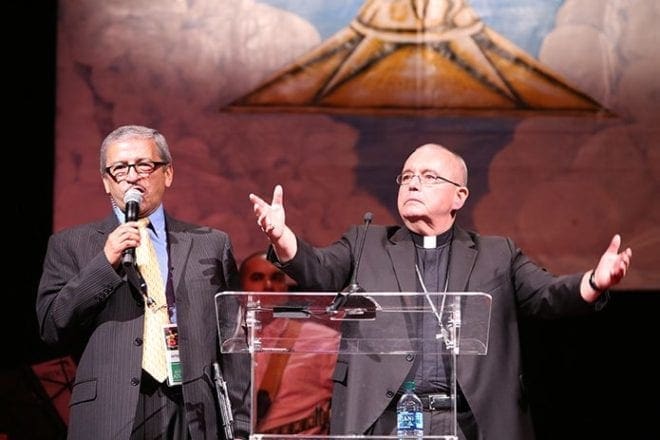
At one point during a visit to the Spanish track Bishop David P. Talley, right, rallied the crowd by having them chant in unison “Construir puentes, no muros (Build bridges, not walls).” Standing next to him at the podium is Jairo Martinez, archdiocesan director of Intercultural and Ethnic Diversity. Photo By Michael Alexander
Bishop David P. Talley began his very short message to attendees with “Soy un gringo. I’m a gringo.”
People laughed hysterically. He asked Jairo Martinez to serve as a translator and then continued, saying that as an American citizen, he respects all immigrants, and his country opens its hearts to immigrants.
“At the parish level we need to act as a bridge in order to help our communities,” Bishop Talley said.
He repeated several times in both English and Spanish “Bridges, no walls!” and made people repeat it after him.
Daniela Moreno, a native of Venezuela, is a translator in the Office of Communications of the Atlanta Archdiocese.